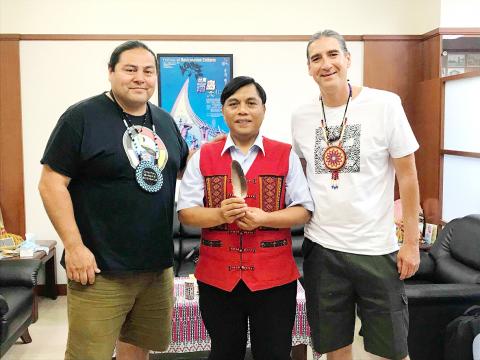Here is perhaps something not to be proud of as a resident of Taiwan: according to Mazaska Talks, a to Web site run by indigenous US activists, four of the nation’s financial institutions are listed among “banks financing indigenous rights violations and the desecration of our earth.”
Despite being minor players, E Sun Commercial Bank, Bank of Taiwan, Taiwan Cooperative Bank and Hua Nan Commercial Bank have allegedly invested in several controversial pipeline projects in the US, including the Dakota Access, which sparked major indigenous resistance as it would threaten sacred grounds and affect the quality of water in the area. Construction has also brought an influx of male workers that have led to a surge in violent crime, especially against women.
“We are here today to let you know that the power is in the people’s hands, and to wake up is to know where your money is going … [and] who’s actually using your money to invest. Most people don’t know, and some people in the banks don’t even know,” indigenous US filmmaker and activist Myron Dewey tells the audience in Taipei after a screening of his film Awake about the Standing Rock protests.

Photo courtesy of Chad Yen
Exhausted after spending the previous day meeting with officials at the Bank of Tokyo Mitsubishi, a primary target for divesting in the pipeline projects, Dewey and fellow indigenous activist Patrick Kincaid, who is a lawyer, arrived in Taiwan on Monday for a two-week tour where they will screen the film, share their experience in indigenous and grassroots activism, visit with Aboriginal groups and finally, attempt to plead their case with the Taiwanese banks.
Dewey and Kincaid refer to themselves as “water protectors,” which is what those opposing the pipeline prefer to be called instead of “protesters.”
Since they have not been able to stop the pipeline construction, the activists turned to divestment campaigns to curb its funding. Last February, Seattle became the first city to sever ties with its primary financial services provider of Wells Fargo, which is investing in the pipeline and the company building it.
Dewey and Kincaid have their unique ways of persuading people to join their cause.
“We’re all born of water from our mothers, and it’s important to recognize that even across the world, we’re connected by the water we drink. When we see the pipelines go through, we consider it raping our mother,” Dewey says.
As a lawyer, Kincaid invokes international indigenous rights accords and agreements that these banks and governments are violating.
“I’d like to see if we can stimulate a unification of citizens in Taiwan and the US to address our colonial governments’ approach to environmental and social issues associated with energy policy,” he says. “Indigenous and citizens both, we’re all in the same boat. We share the colonial banking structures that are promoting these international extraction industries that are destroying the world.”
For more information about their trip and a list of public talks and screenings, visit www.facebook.com/DKTaiwanTour2018.

On April 26, The Lancet published a letter from two doctors at Taichung-based China Medical University Hospital (CMUH) warning that “Taiwan’s Health Care System is on the Brink of Collapse.” The authors said that “Years of policy inaction and mismanagement of resources have led to the National Health Insurance system operating under unsustainable conditions.” The pushback was immediate. Errors in the paper were quickly identified and publicized, to discredit the authors (the hospital apologized). CNA reported that CMUH said the letter described Taiwan in 2021 as having 62 nurses per 10,000 people, when the correct number was 78 nurses per 10,000

As Donald Trump’s executive order in March led to the shuttering of Voice of America (VOA) — the global broadcaster whose roots date back to the fight against Nazi propaganda — he quickly attracted support from figures not used to aligning themselves with any US administration. Trump had ordered the US Agency for Global Media, the federal agency that funds VOA and other groups promoting independent journalism overseas, to be “eliminated to the maximum extent consistent with applicable law.” The decision suddenly halted programming in 49 languages to more than 425 million people. In Moscow, Margarita Simonyan, the hardline editor-in-chief of the

Six weeks before I embarked on a research mission in Kyoto, I was sitting alone at a bar counter in Melbourne. Next to me, a woman was bragging loudly to a friend: She, too, was heading to Kyoto, I quickly discerned. Except her trip was in four months. And she’d just pulled an all-nighter booking restaurant reservations. As I snooped on the conversation, I broke out in a sweat, panicking because I’d yet to secure a single table. Then I remembered: Eating well in Japan is absolutely not something to lose sleep over. It’s true that the best-known institutions book up faster

Though the total area of Penghu isn’t that large, exploring all of it — including its numerous outlying islands — could easily take a couple of weeks. The most remote township accessible by road from Magong City (馬公市) is Siyu (西嶼鄉), and this place alone deserves at least two days to fully appreciate. Whether it’s beaches, architecture, museums, snacks, sunrises or sunsets that attract you, Siyu has something for everyone. Though only 5km from Magong by sea, no ferry service currently exists and it must be reached by a long circuitous route around the main island of Penghu, with the